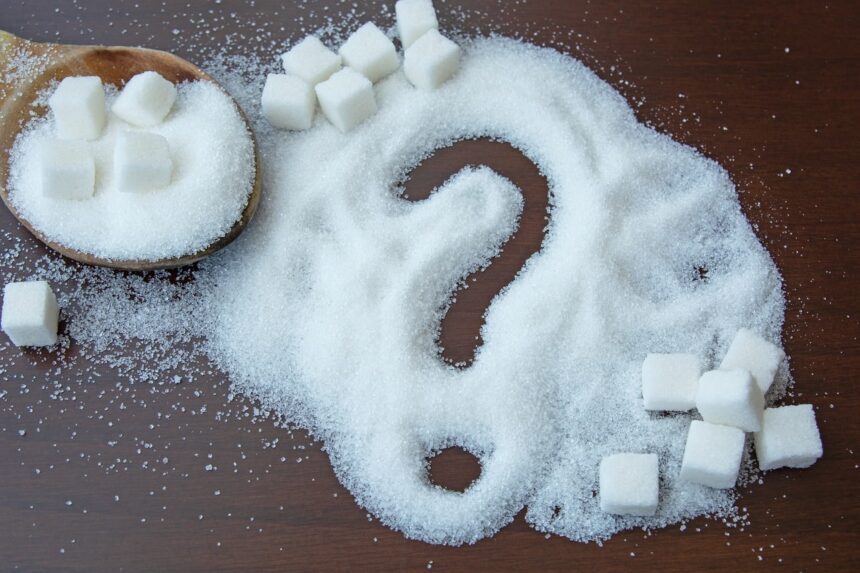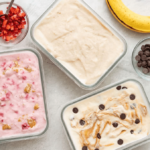Sugar has been a staple in human diets for hundreds of years. Ranging from the times when our ancestors discovered sweetness in fruit to at this time’s huge array of sugary meals and drinks. The way in which we eat sugar has drastically modified. Our ancestors discovered their sweetness in fruits, which is a pure supply. Nevertheless, at this time, our sugar consumption extends far past simply fruit. Sugar is now processed and added to quite a few merchandise like sodas, candies, and even fruit juices.
Apart from altering the sources of our sugar consumption, this shift additionally has an impression on our well being. As an example, throughout sugar processing, when fruit converts into juice, it loses its fibre. Because of this, it leaves behind a high-sugar liquid that may trigger our blood sugar ranges to rise and fall sharply, not like the extra gradual impression of entire fruit.
Sugars come from numerous sources and go by many various names. Supermarkets additionally provide a wide range of sugar choices, together with granulated sugar, brown sugar, and synthetic sweeteners. The abundance of sugar decisions in fashionable instances makes it simpler for folks to present in to their pure want for sweetness and eat extra sugar than their our bodies require.
Nevertheless, it’s essential to recognise that not all sugars are created equal, nor are they universally dangerous. Labelling all sugar as dangerous oversimplifies the matter, particularly when discussing the connection between sugar and diabetes. Opposite to widespread perception, sugar will not be the only real villain within the diabetes story. The fact is extra nuanced. It includes the quantity of sugar consumed and an array of different components associated to our metabolism.
Proceed studying to grasp how sugar consumption components into diabetes.
How Sugar Impacts the Physique
Consuming sugar units off a posh course of in your physique. Most sugars break down within the small gut. Right here, enzymes change complicated sugar molecules into easier ones like glucose, galactose, and fructose. Your physique shops glucose in muscle tissues and the liver as glycogen, which is was power when your physique wants it.
As glucose enters the bloodstream, blood glucose ranges rise. In response, the pancreas releases insulin to move glucose all through the physique. Nevertheless, with the consumption of huge quantities of added sugar over time, cells can develop insulin resistance. It means the cells in our physique begin to ignore the sign of insulin, making it more durable for glucose to enter the cells. Because of this, sugar builds up within the bloodstream as a substitute of getting used for power. Insulin resistance additionally will increase the danger of irritation, sort 2 diabetes, PCOS, and different persistent situations.
Everybody has had a sugar overload in some unspecified time in the future. It results in a fast insulin launch, which goals to maintain blood sugar steady. Nevertheless, as soon as the sugar impact diminishes, your physique is left with extra insulin and inadequate glucose for power, resulting in the notorious ‘sugar crash’.
Experiencing a sugar overload adopted by a sugar crash might be uncomfortable. Nonetheless, it’s usually not harmful if it doesn’t happen very often. Nevertheless, for people with diabetes, sugar overload can have extra extreme results. The actual fear is the long-term results of overeating sugar.
It’s essential to apply moderation when consuming sugar. Whereas we understand brown sugar as probably higher, any sugar impacts blood sugar ranges if it exceeds the really useful consumption. It’s all about steadiness.
Sugar & Its Elements
Sugar breaks down into two essential elements: glucose and fructose. These are the best types of carbohydrates. Glucose is our main power supply, because it fuels all the things from mind features to muscle tissues. After we eat meals containing carbohydrates, they break down into glucose throughout digestion. It, in flip, enters the bloodstream, inflicting blood sugar ranges to rise.
Fructose is one other part of sugar generally present in fruits and added sugars like high-fructose corn syrup. It metabolises in a different way from glucose and may contribute to insulin resistance and different metabolic problems when consumed in extra.
An insulin spike happens when blood sugar ranges rise quickly after consuming a meal excessive in carbohydrates or sugars. In response to elevated blood glucose ranges, the pancreas releases insulin. Due to this fact, this hormone helps cells soak up glucose from the bloodstream for power or storage. Nevertheless, in situations like insulin resistance or sort 2 diabetes, cells turn into much less aware of insulin. That results in elevated blood sugar ranges and subsequent insulin spikes. Over time, persistent insulin spikes can pressure the pancreas, contribute to additional insulin resistance, and enhance the danger of creating sort 2 diabetes.
It’s no secret that within the case of diabetes, the physique both doesn’t produce sufficient insulin (sort 1 diabetes) or turns into immune to the insulin it produces (sort 2 diabetes). That ends in chronically elevated blood sugar ranges. Managing diabetes includes regulating blood sugar ranges by way of dietary modifications, bodily exercise, remedy, and insulin remedy as wanted.
Minimising sugar consumption, notably from sources with excessive fructose content material and processed meals, might help mitigate insulin spikes and help higher blood sugar management in people with diabetes. Moreover, sustaining a balanced food regimen wealthy in fibre, protein, and wholesome fat might help gradual the absorption of sugar into the bloodstream, lowering the probability of sudden spikes in blood sugar ranges.
Sorts of Sugar and Their Affect on Sufferers with Diabetes
Understanding the various kinds of sugar and their results on the physique, particularly for these managing diabetes, is essential. Whereas folks typically see sugar as a dietary villain, not all sugars have the identical impression on blood glucose ranges. From pure sweeteners to synthetic options, every has its execs and cons within the context of diabetes administration. Let’s discover the specifics of assorted sugars to grasp their roles in our diets.
1. White Sugar (Sucrose)
White sugar, or sucrose, is a typical sweetener that gives prompt power. It’s a staple in lots of meals and drinks. Nevertheless, its excessive glycemic index means it may trigger blood sugar ranges to spike rapidly. Because of this, it poses vital challenges for people with diabetes. Since white sugar solely gives the physique with empty energy and no beneficial minerals, its overconsumption can result in weight problems and dental issues. Weight problems is without doubt one of the key components in creating sort 2 diabetes. All this underscores the necessity for moderation.
2. Brown Sugar
Since brown sugar comprises molasses, it presents a hint quantity of minerals like calcium, potassium, iron and magnesium. Nevertheless, it shares lots of the drawbacks of white sugar as it’s also a type of sucrose. Similar to white sugar, it additionally presents a excessive quantity of energy, which impression your blood sugar ranges and weight acquire. Not like the widespread fantasy that brown sugar is more healthy than white sugar, it’s not a really perfect alternative for these managing diabetes and stopping blood sugar spikes.
3. Honey
Honey is a pure sweetener with some well being advantages. It has antioxidant properties, and it comprises hint nutritional vitamins and minerals like calcium, copper, iron, magnesium, manganese, phosphorus, potassium and zinc. It additionally has antibacterial properties and helps relieve coughs and wounds.
Whereas most individuals imagine that honey is a wholesome pure sweetener, it’s essential to grasp that it’s not appropriate for these with diabetes. Though honey has a decrease glycemic index than refined white sugar, because it will get digested slower than white sugar, it additionally has a high-calorie depend. Because of this, honey consumption may also elevate blood sugar ranges. That makes it a much less appropriate choice for strict diabetes management. If used, it ought to be sparsely.
4. Jaggery
Jaggery is completely different from common sugar as a result of it’s constituted of longer sucrose chains. It means your physique breaks it down extra slowly, offering power at a gradual tempo, not suddenly. Jaggery additionally comprises important minerals like iron, magnesium, phosphorus, and zinc. Throughout its making in iron vessels, jaggery picks up a very good quantity of iron.
Although jaggery has extra vitamins and would possibly look like a more sensible choice than white sugar, it’s not essentially protected for folks with diabetes. Jaggery nonetheless has numerous sugar and may rapidly elevate blood sugar ranges. The bottom line is to take pleasure in jaggery however solely a bit of at a time to keep away from large spikes in your blood sugar.
5. Stevia
Stevia stands out for having zero energy and no impression on blood sugar. That makes it a beneficial various for folks with diabetes. Derived from the stevia plant, it presents a candy style with out the drawbacks of conventional white sugars. Nevertheless, some people might discover its style bitter and expertise gastrointestinal discomfort. In some instances, it would result in low blood stress as nicely.
6. Synthetic Sweeteners (Aspartame, Saccharin, Sucralose)
Synthetic sweeteners present a calorie-free method to sweeten meals and drinks with out elevating blood sugar ranges. They’re widespread amongst these seeking to cut back calorie consumption and handle diabetes. Regardless of their advantages, debates about their long-term well being results persist. The truth is, some folks report antagonistic reactions like digestive points and elevated blood stress.
With the abundance of sugar options obtainable, making knowledgeable decisions might be overwhelming. Consulting a licensed nutritionist, comparable to these at fitnesscalorie, can present personalised recommendation to navigate these decisions successfully. It would guarantee dietary selections that help your general well being and diabetes administration targets.
Key Components in Diabetes Danger
Whereas some analysis hyperlinks sugar-sweetened drinks to a better threat of diabetes, the proof isn’t sufficient concerning sugars like sucrose and fructose. Subsequently, knowledge additionally reveals that substituting sucrose for fructose in managed diets didn’t present antagonistic results on diabetes threat components over a brief time frame.
Total, there’s little direct proof linking sugar consumption to elevated diabetes threat. Given the well-established hyperlink between diabetes and weight problems, specializing in weight problems as a threat issue is taken into account extra prudent.
Past Sugar: Different Components to Contemplate
Apart from sugar, another components may also result in diabetes. These components embody genetics, weight problems, way of life decisions, stress, and sure medical situations like hormonal points or pancreas removing. Managing these components by way of food regimen, train, and stress discount is essential for diabetes prevention and care.
Genetic predisposition additionally contributes to diabetes susceptibility. Sort 1 diabetes reveals a powerful hereditary part, and each genetic and environmental components can affect sort 2 diabetes.
Weight problems, typically linked to unhealthy dietary habits and sedentary life, is a distinguished threat issue for sort 2 diabetes, emphasising the significance of weight administration and way of life modifications. Moreover, persistent stress and aforementioned medical situations can exacerbate insulin resistance. It underscores the necessity for complete diabetes administration methods that embody stress discount, wholesome residing practices, and medical supervision.
Understanding these determinants and adopting a holistic method to diabetes prevention and administration are important for selling general well-being and minimising diabetes-related problems.
Suggestions for Sugar Consumption
Together with sugar sparsely is a part of a balanced food regimen. The American Coronary heart Affiliation suggests males restrict added sugar to not more than 9 teaspoons (36 grams) per day, whereas girls ought to intention for lower than six teaspoons (25 grams).
Sugar and Sort 2 Diabetes
Sugar consumption will not be associated to sort 1 diabetes. This type of diabetes occurs when the physique’s immune system assaults the pancreas’s insulin-producing cells. It’s an autoimmune response, not associated to food regimen or sugar consumption.
Now, sort 2 diabetes, the situation outcomes from components past simply sugar consumption. Sort 2 diabetes occurs when our physique struggles with utilizing insulin correctly, and our pancreas can’t make sufficient insulin to maintain up. Stress, being pregnant, and different components may also play a task.
Even in the event you don’t eat sugar in any respect, you may nonetheless get diabetes due to your genes. Nevertheless, consuming numerous sugar could make you extra more likely to develop diabetes. That’s primarily as a result of sugary meals and drinks can result in weight acquire, and being chubby is a key threat issue for sort 2 diabetes. So, whereas sugar doesn’t instantly trigger diabetes, overeating can not directly enhance your threat.
Overeating refined sugar or carbohydrates over time may cause issues like an excessive amount of insulin in your blood, resistance to insulin’s results, and hassle preserving your blood sugar steady. It’s very true in case you are bodily inactive.
Insulin
For the reason that connection between diabetes and insulin is well-known, it’s vital to maintain insulin in consideration. Insulin manages the absorption of glucose (sugar) into cells from the bloodstream. Because of this, the extra sugar an individual consumes, the upper the blood sugar rises, resulting in elevated insulin launch. Over time, the physique might develop resistance to insulin, leading to sort 2 diabetes. Any carbohydrate can spike blood glucose ranges, however processed sugar, excessive fructose corn syrup, and refined sucrose can spike these ranges so rapidly that the insulin ranges can’t sustain.
In easy phrases, consuming sugar by itself doesn’t instantly trigger diabetes. All of it comes all the way down to how the physique produces and makes use of insulin. A food regimen excessive in added sugars, saturated fat, and extra energy will increase the danger of chubby, weight problems, nonalcoholic fatty liver illness, and metabolic syndrome, inflicting the event of diabetes.
Signs of Too A lot Sugar in Your Physique
Sugar, particularly glucose, will not be inherently dangerous. The truth is, the human physique depends on glucose, a easy sugar, as a main supply of gas. Nevertheless, extreme sugar consumption can have antagonistic results on the physique. Whether or not you’ve gotten diabetes or not, it’s all the time good to watch glucose ranges frequently. Switching to a CGM just like the HealthifyPro Steady Glucose Monitor is a sensible step, offering prompt insights into how particular meals combos impression blood glucose ranges. It means that you can measure fasting, post-meal, and every day glucose ranges extra successfully.
Right here’s an article to grasp the nuances of CGM higher: What’s a Steady Glucose Monitor?
Step one to stopping persistent well being situations, comparable to diabetes, is so simple as recognising the next warning indicators of an excessive amount of sugar within the physique:
Weight Acquire
Sugary meals and drinks typically pack in numerous energy with out offering any notable dietary worth. Consuming extra empty energy than you burn can result in weight acquire. Limiting and being conscious of your sugar consumption helps cut back the danger of weight acquire.
Tooth Decay
The sugar in candy meals doesn’t instantly trigger tooth decay. Nevertheless, while you overconsume sugary meals, the pure micro organism within the mouth convert them into an acidic substance. Like all acids, these acids erode the enamel’ enamel, weakening them and making them extra susceptible to cavities.
Pores and skin Points
Excessive-sugar diets enhance oil and androgen (hormone) manufacturing. In addition they speed up the creation of superior glycation finish merchandise (AGEs). The heightened androgen manufacturing raises the probability of zits. On the similar time, the elevated presence of AGEs hastens the pores and skin’s ageing course of and causes wrinkles.
Elevated Starvation and Cravings
One of many early indicators of overconsumption of sugar is starvation. That’s primarily because of the empty energy white sugar presents. For the reason that human physique rapidly breaks down sugary meals and drinks, sugar solely satisfies the style buds however doesn’t fill the abdomen. Subsequently, when your physique experiences a crash, it indicators starvation, urging you to hunt extra power. Usually, this results in cravings for fast power sources, typically within the type of sugary meals. Sadly, such cravings typically end in a repetitive cycle of reaching for high-sugar snacks, solely to really feel hungry once more shortly afterwards.
Mind Fog and Low Power
Meals objects considerable in sugar however poor in protein, fibre, or fats present a short-lived power enhance adopted by a speedy decline in blood sugar, generally referred to as a crash. It causes your physique to fluctuate between peaks and crashes always. These fluctuations can considerably decrease focus, leading to “mind fog”. Furthermore, they deplete your power ranges, lowering the probability of partaking in bodily actions and performing every day duties at your finest.
Temper Swings
Extreme sugar consumption may also make you moody, irritable, or on edge. A high-sugar meal missing in protein and fats rapidly spikes your blood sugar. Nevertheless, as your physique rushes to course of it, your power ranges crash, leaving you feeling sluggish and irritable.
A Shift in Style
Over time, your mind turns into accustomed to a really excessive degree of sweetness, and this may have an effect on your satisfaction with much less candy options. It could result in a heightened expectation of sweetness, making it difficult to understand meals with decrease sugar content material. So, in the event you discover that meals don’t style as candy as they as soon as did, or in the event you really feel the necessity to add sugar to reinforce their flavour, it’s possible you’ll be consuming extreme quantities of sugar.
Sleep Disturbance
It is likely to be instinctive to hunt a sugary deal with when feeling drained within the night, however this behavior might disrupt your evening’s sleep. Extreme sugar consumption can result in late-night consuming attributable to fluctuating blood sugar ranges, negatively impacting sleep. Disrupted sleep, in flip, will increase the need for sugar the subsequent day. Some sugary treats additionally embody caffeine, additional compromising your sleep, particularly if consumed within the evenings. The mix of sugar and caffeine varieties a problematic duo that may intrude together with your relaxation.
fitnesscalorie Suggestion
Excessive blood sugar ranges have been linked to mineral deficiencies comparable to chromium and magnesium, each of which regulate blood sugar. Chromium-rich meals embody meats, fruits, greens, and nuts. Magnesium-rich meals embody darkish leafy greens, squash and pumpkin seeds, tuna, entire grains, darkish chocolate, bananas, and beans. Select entire meals over extremely processed meals, eat protein and fibre-rich meals, and drink a number of water. Discover acceptable substitutes. Exchange soda and juice with wholesome choices comparable to low-fat milk, unsweetened iced tea, and water flavoured with lemon, cucumber, or mint slices. Exchange a bowl of candy snacks with recent fruit like bananas, oranges, and apples. Common train might help improve insulin sensitivity.
The Remaining Phrase
Understanding that diabetes isn’t solely attributable to sugar consumption is essential. The situation includes a posh interaction of things, together with insulin resistance, genetic predispositions, and way of life decisions. Whereas the occasional indulgence in sugary treats isn’t more likely to trigger hurt, the long-term results of constantly excessive sugar consumption are a trigger for concern. These considerations lengthen nicely past the danger of diabetes to probably contribute to coronary heart illness, fatty liver, kidney points, and extra.
Noticing the indicators of an excessive amount of sugar in your food regimen, comparable to weight acquire, dental issues, pores and skin situations, fluctuating power ranges, and temper swings, is step one in the direction of safeguarding your well being. Taking proactive measures to watch and modify your sugar consumption is crucial.
On this journey, fitnesscalorie might be your ally. With a personalised method to vitamin and way of life modifications, fitnesscalorie’s knowledgeable nutritionists might help you map out your meals, monitor your sugar consumption, and implement sustainable adjustments. These steps, tailor-made particularly for you, intention to handle or forestall diabetes and in addition improve your general well-being.
Embracing a balanced way of life with conscious consuming habits and the steering of fitnesscalorie’s professionals, you may navigate the complexities of diabetes administration and embark on a path to more healthy residing.
Begin your Diabetes transformation with fitnesscalorie
Disclaimer: The aim of this text is simply to disperse information and lift consciousness. It doesn’t intend to exchange medical recommendation from professionals. For additional data, please contact our licensed nutritionists Right here.
Analysis Sources
1. Relationship between Added Sugars Consumption and Persistent Illness Danger Components: Present Understanding
2. The connection of food regimen and zits
3. Relationship Between Added Sugar Consumption and Sleep High quality Amongst College College students: A Cross-sectional Examine
4. Fructose and sugar: A significant mediator of nonalcoholic fatty liver illness
5. Dietary sugar consumption and Cardiovascular Well being
Steadily Requested Questions (FAQs)
Q: Is there a direct hyperlink between consuming sugar and the event of diabetes?
A: There may be not sufficient proof to ascertain a direct hyperlink between sugar consumption and diabetes. Nevertheless, there’s an oblique hyperlink that reveals the numerous impression of sugar consumption in your general well being and diabetes. Whereas consuming extreme sugar can result in weight acquire, a threat issue for sort 2 diabetes, sugar alone will not be the direct trigger. Sort 2 diabetes includes complicated interactions, together with genetics, way of life, and dietary patterns past simply sugar consumption.
Q: What function does sugar play within the threat of Sort 2 diabetes?
A: Sugar performs an oblique function within the threat of creating sort 2 diabetes. It’s primarily by way of sugar’s contribution to weight acquire and weight problems. Excessive-calorie diets wealthy in sugary meals and drinks can result in extra physique weight, which is a major threat issue for sort 2 diabetes. Nevertheless, sugar in itself is one among many components that may affect the illness’s growth, with general food regimen and way of life decisions additionally play essential roles.
Q: Are there particular kinds of sugar which can be extra more likely to contribute to diabetes?
A: Sure, added sugars present in processed meals and drinks, like high-fructose corn syrup and refined sucrose, usually tend to contribute to the danger of diabetes. These sugars can rapidly elevate blood glucose ranges and result in weight acquire when consumed in extra. Pure sugars in fruit and veggies have a much less pronounced impact on blood sugar and general well being. That’s as a result of meals and greens provide fibre, nutritional vitamins, and minerals.
Q: How a lot sugar consumption is taken into account protected to keep away from the danger of diabetes?
A: The American Coronary heart Affiliation recommends limiting added sugar to not more than six teaspoons (about 25 grams) per day for girls and 9 teaspoons (about 36 grams) every single day for males to help general well being and cut back the danger of diabetes. This guideline helps handle calorie consumption and encourages a balanced food regimen. Nevertheless, in people with diabetes, it’s best to keep away from processed and refined sugar completely.
Q: Can reducing out sugar from my food regimen forestall or reverse diabetes?
A: Slicing out sugar alone can’t forestall or reverse diabetes. Nevertheless, it may be a major a part of a wholesome way of life that reduces threat. For folks with Sort 2 diabetes, a balanced food regimen low in added sugars, mixed with common bodily exercise and weight administration, might help forestall the illness or handle its signs extra successfully.
Q: Is it true that sugar consumption alone can result in each Sort 1 and Sort 2 diabetes?
A: No, it’s not true that sugar consumption alone can result in each sort 1 and kind 2 diabetes. Sort 1 diabetes is an autoimmune situation not attributable to sugar consumption. On the similar time, sugar consumption can also be not the only real explanation for sort 2 diabetes. Whereas extreme sugar consumption can contribute to weight problems, which is a threat issue for sort 2 diabetes, it’s not the one trigger. Sort 2 diabetes outcomes from a mixture of genetic, way of life, and environmental components.
Q: Do completely different types of sugar, comparable to pure sugars versus added sugars, have various impacts on diabetes threat?
A: Sure, completely different types of sugar have various impacts on diabetes threat. Pure sugars present in fruit and veggies include fibre, nutritional vitamins, and minerals. Because of this, consuming these meals can cut back sugar’s dangerous impression on blood glucose ranges. Nevertheless, added sugars (refined or processed) lack dietary worth and usually tend to contribute to weight acquire, subsequently resulting in elevated diabetes threat.
Q: What’s the connection between insulin resistance and a high-sugar food regimen with diabetes?
A: Overconsumption of sugar in your food regimen can contribute to insulin resistance. It’s a situation the place the physique’s cells turn into much less aware of insulin indicators to take up glucose from the bloodstream. Over time, insulin resistance can result in increased blood sugar ranges and enhance the danger of creating sort 2 diabetes. Consuming giant quantities of added sugars can elevate the danger by overloading the physique’s potential to handle glucose successfully.
Q: Are there any research suggesting a causal relationship between sugar consumption and diabetes?
A: Whereas many research have explored the connection between sugar consumption and diabetes, most counsel an oblique hyperlink quite than a direct causal relationship. As per these research, extreme consumption of sugar-sweetened drinks and meals excessive in added sugars can result in weight problems, which is a major threat issue for sort 2 diabetes. Nevertheless, sugar consumption alone will not be conclusively confirmed to trigger diabetes. Different components like general food regimen and way of life additionally come into consideration.
Q: Can people with diabetes safely eat sure kinds of sugars or sweeteners sparsely?
A: Folks with diabetes can safely eat sure kinds of sugars or sweeteners sparsely, notably people who have minimal to no impression on blood glucose ranges. These sweeteners embody stevia or some synthetic sweeteners. Nevertheless, it’s essential to watch general carbohydrate consumption and contemplate the dietary worth of meals consumed. Furthermore, consulting with a healthcare skilled or dietitian is really useful to tailor dietary decisions to particular person well being wants and diabetes administration targets.










